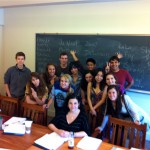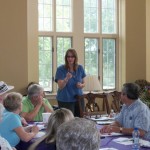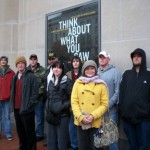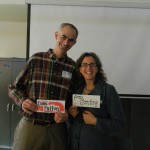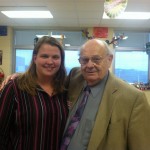Bread Crumbs
Forums › 2023 Summer Seminar › Looking at Perl & Krug: due JUNE 15 (or earlier) › Bread Crumbs
-
AuthorPosts
-
-
June 17, 2023 at 12:29 pm #31870
Ahhhh! Just completed our regional seminar, and I am exhausted in all the good ways…. more on that later, but for now:
What similarities and differences do you find in their memoirs?
The same, but different. While both Nora and Sondra had complicated and complex experiences facing their personal and families’ pasts, each had an original intention or goal. Sondra went as an educator, intent on teaching, then was faced with the realities of facing her own and her students’ histories. It was as Sondra wrestled with the buried emotions and responses that she then ended up supporting her students’ and their families and community to articulate and grapple with their own questions. Nora knew from the outset that she would likely be up against her demons. “The German people are not our friends. However sorry they may seem, they cannot come back into the civilized fold just by saying, ‘I’m sorry’… they must prove they have been cured.” Nora struggles with even the notion of stating her nationality. But as she researches and dig into her father’s story, and gathers the evidence, her lens widens. When her mother receives a copy of the file, ‘“I never considered that he had suffered, too,’ she says, and blows her nose. ‘Reading about his Nazi membership wasn’t easy.’”
Both Sondra and Nora have closure in their books, but perhaps not completely in their lives. There will always be questions. “I’m glad…that I went back and collected the bread crumbs…that I know what I didn’t know before: that HEIMAT can only be found in memory, that it is something that only begins to exist once you have lost it.”
How do these relate to your life?
I have never been truly or overtly conflicted or challenged by my past. Perhaps I have not been as curious as I could have been. There are definitely times when I wonder more about my father’s and mother’s stories and their families. And when I traveled in Germany in the ‘70’s, yes, I definitely considered claiming to be Canadian. But I did not. I was (stupid) young, and my friends were young, and I did not even consider that I was a mere short generation from asking the questions about what my German friends’ parents did or did not do during the War. I am also now of the generation when my parents and grandparents are gone, and I am left with snippets of stories, and a box full of (mostly unlabled!) photos and papers. Who and how to ask the questions; do I have the time energy to ‘collect the bread crumbs’ of this or that artifact or document? What, if anything, do I “owe” to my children?
-
-
AuthorPosts
- You must be logged in to reply to this topic.
Recent Replies
Recently Active
-
Active 2 days, 20 hours ago
-
Active 3 days, 20 hours ago
-
Active 4 days ago
-
Active 4 days, 17 hours ago
-
Active 1 week, 2 days ago
- View All Members

